U.S. Rockets Weightlofter
U.S. Rockets - Weightlofter {Kit} (1019, K-19) [1979-]
Contributed by Lance Alligood
| Construction Rating: | starstarstarstarstar_border |
| Flight Rating: | starstarstarstarstar |
| Overall Rating: | starstarstarstarstar |
| Manufacturer: | U.S. Rockets  |

Brief:
The U.S. Rockets (USR) Weightlofter is a 7-motor mid power cluster rocket with
six 24mm outboard tubes and one central 29mm motor tube. This also is a great
kit for someone that is looking for a challenging, labor intensive mid power
rocket build. A 24mm motor adapter is included so that it can be flown on a
smaller central motor as well.
Construction:
I ordered this kit along with 2 others directly from USR. They were ordered and
received without payment first. When I received the bill via email, USR gave me
a discount on my order that resulted in a total amount (including shipping) for
less than the cost of the 3 kits separately. Both the ordering/payment
arrangement and multi-kit discount are standard USR practices. Add in the
impressively fast turnaround time on email communications (responses in less
than one hour is in fact quite common!), and you realize that you are dealing
with a very customer driven business! The kits all showed up on my door in 2
boxes just a few days after having my order confirmed.
The Weightlofter kit comes inside of a plastic bag with hang tag typical of most rocket kits you would find in a hobby store. Initially I thought that there had to be more than just a couple of tubes and a nose cone before opening the bag and I sure wasn't disappointed when I opened it--an amazing assortment of parts came out of the large body tube! After verifying all parts were present and intact (which took a while), I read through the instructions. The Weightlofter is rated a skill level 3 and I wanted to scout out any potential "gotchas".
The kit includes:
- 1 2:1 ogive balsa nose cone
- 1 18" x 2.25" body tube
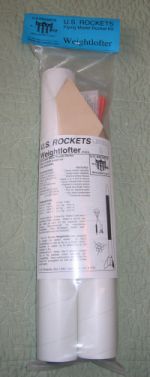
- 1 9" x 2.25" body tube
- 1 6" x 29mm MMT tube
- 6 3" x 24mm MMT tubes
- 1 coupler tube
- 2 1/8" thick plywood centering rings
- 1 2.17" plywood coupler bulkhead plate
- 1 1.21" x 3/32" plywood bulkhead plate
- 1 screw eye
- 1 3-fold paper shock cord mount
- 1 7' x 1/4" elastic shock cord
- 3 1/8" thick plywood fins
- 1 1/4" launch lug
- 1 16" mylar parasheet (parachute)
- 1 24mm motor adapter kit
- Decals
- Instruction manual
- Advanced Information Report (AIR) #3 -- Motor Installation, Clustering, and Staging
After looking over the instructions, I saw that this was going to be a much different build than I had anticipated at the time of ordering the kit. First off, there is no tube slotting or cutting to be done. The motor mount will take longer than a 3FNC to build but mostly it's time spent waiting for glue to dry. Speaking of glue, USR recommends that yellow wood glue (aliphatic resin) be used for assembling the Weightlofter and I completely agree with that recommendation.
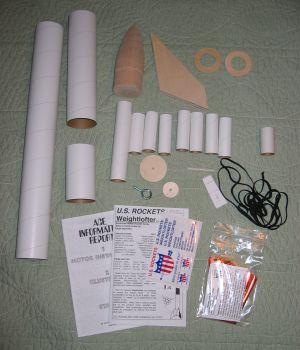 I
started by lightly sanding all motor mount tubes and the short airframe tube
(all USR tubes are glassine coated and practically seamless) so that the wood
glue would have something to bite into. I also quickly sanded the slightly
rough edges of the bulkheads and centering rings so that all parts would fit
smoothly together.
I
started by lightly sanding all motor mount tubes and the short airframe tube
(all USR tubes are glassine coated and practically seamless) so that the wood
glue would have something to bite into. I also quickly sanded the slightly
rough edges of the bulkheads and centering rings so that all parts would fit
smoothly together.
The short airframe tube is first marked with assistance from the alignment guide in the instructions to aid in the placement of the fins and outboard motor tubes. Then I started the assembly by gluing and filleting the centering rings onto the 29mm tube. Both rings are near one end of the tube so that when inserted into the small airframe tube with the aft centering flush with end of the larger tube, about half of the motor tube is hanging out. While the central motor mount is drying, the smaller 24mm motor tubes are gathered up and glued together in matching pairs. After they have dried, each pair is attached to the 29mm tube so that they are centered on each of the 3 lines of the main airframe tube. This leaves about half of the forward end of these tubes exposed outside the diameter of the 2.25" main airframe tubing. At this point I allowed everything to dry overnight before continuing the build.
I was really impressed with the 1/8" plywood fins in this kit. They had the telltale burned edges of being laser cut, were a precise matched set, and of high quality material that assured me that they could hold up to the thrust of 7 motors while only being surface/wedge mounted. The instructions recommend airfoiling or at least rounding the leading and trailing edges. I chose to only round the leading edge. Details, however, were light regarding attachment of the fins to the body. The root edge required a fair amount of work as all 3 fins need to use wedge attachment to fit in the valley between each pair of 24mm tubes but remain flat to attach along the larger 2.25" airframe above it. That meant sanding a V shape into the bottom 3" of the root edge. My Dremel with sanding drum attachment made quick work of this task. It only took a couple minutes or so per fin because I didn't need to be as focused on looks as much as a good fit, which meant I left a slightly rugged edge for the glue to adhere to. It proved to be quite beneficial to do this! (Gotcha #1: I should note that one fin required some additional sanding along the root edge because I had used a little too much glue to attach the 24mm tubes together earlier on.) Completing this same task by hand for all 3 fins would have taken considerably longer and been significantly less enjoyable. The fins were attached one at a time with yellow wood glue, aligned, and held in place with masking tape until dry before attaching the next fin. Fillets were applied in the same patient manner, which indeed took a while as there are quite a few!
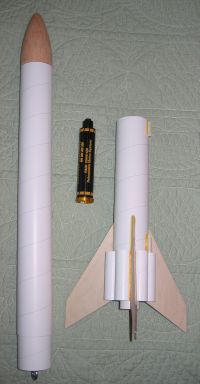 While I
prefer rail buttons on my mid and high power rockets, the Weightlofter would
require some serious standoffs for the rail buttons to have enough clearance
over the outboard motor tubes. That meant keeping it simple by going with the
included launch lug. The 1/4" launch lug is cut in half at an angle (to
help minimize drag). One half is glued even with the aft end and nested between
a gap in the outboard tubes and the other half is mounted at the forward end of
the short main airframe tube. Fillets were applied to them as well.
While I
prefer rail buttons on my mid and high power rockets, the Weightlofter would
require some serious standoffs for the rail buttons to have enough clearance
over the outboard motor tubes. That meant keeping it simple by going with the
included launch lug. The 1/4" launch lug is cut in half at an angle (to
help minimize drag). One half is glued even with the aft end and nested between
a gap in the outboard tubes and the other half is mounted at the forward end of
the short main airframe tube. Fillets were applied to them as well.
The elastic shock cord is attached inside the short main airframe tube with the tried-and-true paper 3-fold method. The other end is tied to the screw eye and the streamer is attached in the middle (although I chose to clip it on with a snap swivel from my range box).
The payload bay and coupler were nothing out of the ordinary. There are 2 bulkheads, one that fits nicely inside the coupler tube and a smaller one (~1.25" diameter). These are glued together to create a single bulkhead that is thicker in the middle than the edges, allowing for a minimal but worthy weight savings. The screw eye is twisted into the bulkhead and the subassembly is glued and filleted into the coupler tube. Once dry, the coupler tube is glued halfway into one end of the 18" payload tube. USR recommends to add noseweight for G and larger motors to ensure stability and provide additional momentum during high thrust flights. For this purpose, I chose to friction fit the nose cone. When the time comes, weight will probably be a simple, flexible system that will allow flat washers to be screwed into the base of the nose cone. And although not mentioned in the instructions, 1/16" vent hole were drilled into the payload and main tube to prevent any premature separations during flight.
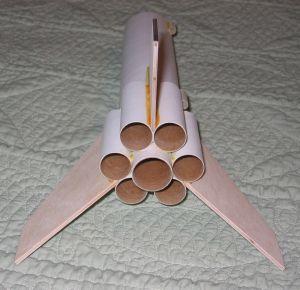 The
last step in the build is to assemble the 24mm motor adapter, which consists of
2 tubes that are glued inside each other. Masking tape is needed to provide a
snug fit and form a thrust ring before using it.
The
last step in the build is to assemble the 24mm motor adapter, which consists of
2 tubes that are glued inside each other. Masking tape is needed to provide a
snug fit and form a thrust ring before using it.
Overall, this turned out to be an easier yet more labor intensive build than what I had originally thought it was going to be when I looked through the instructions. Because of the complicated motor mount assembly and fin attachment, the Weightlofter is worthy of the manufacturer's rating as a skill level 3 kit in my book. Gotcha #2: The USR Weightlofter is designed for clustered mid power flights, not necessarily large single motor flights. With the rocket fully assembled per the instructions, there is only 4.5" available inside the airframe from the forward end of the motor mount tube to the bottom of the payload tube coupler for wadding, shock cord, and chute. That's enough room for those parts but it's still a relatively small volume of space. I recognized this situation was going to occur back when I read through the instructions (before even beginning the build and again when doing a dry fit of the parts), but I was content with building this kit stock. A simple resolution for anyone desiring more room could easily build this kit with 2.25" tubing flip-flopped--the 18" tube attached to the motor mount and the have a shorter 9" payload section.
Finishing:
The balsa nose cone was prepped for paint by glazing it with 20-minute
finishing epoxy, sanding the rough spots with 220 grit sandpaper, applying a
thin coat of diluted Elmer's Fill 'n' Finish, and following that with more
sanding to give it a hard, smooth shell. The fins had a coat of diluted Elmer's
Fill 'n' Finish smeared on and sanded as well to remove any traces of wood
grain. In an effort to minimize a buildup of paint inside the outboard motor
tubes (and therefore make it difficult to insert/remove motors in the future),
I balled up some newspaper and stuffed it inside all 6 outboard motor tubes. My
paint stand has a used 29mm SU motor to support the rocket in the central MMT,
so no worries about getting any paint overspray there. The entire rocket was
then given a coat of Krylon gray primer and sanded with 320 grit. I found some
low spots that needed a little extra FnF and sanded everything smooth followed
by a coat of Krylon white primer. A third gotcha presented itself during
priming (and painting later on) because of the gap between the 24mm tubes. Care
needs to be taken to get paint in there but not so much at one time to cause a
run. One more pass with 400 grit sandpaper to make sure everything was smooth
and it was ready for final paint.
The suggested paint scheme is florescent colors in a pattern to detect body roll during flight, otherwise it is left up to the builder to come up with anything more decorative than that. I like how the Weightlofter is similar in size and stature to my USR Banshee so I thought I would use a similar paint scheme on the Weightlofter. I would have used the same colors but I did not have enough orange. I did have plenty of yellow and blue though. The yellow was sprayed first and allowed to dry before masking the stripes with clear tape and laying down the blue. After waiting a good 24 hours, the rocket was rubbed down with 3M Rubbing Compound and an old T-shirt to give it a nice shine and help smooth out any minor flaws or ridges in the paint.
Construction Rating: 4 out of 5
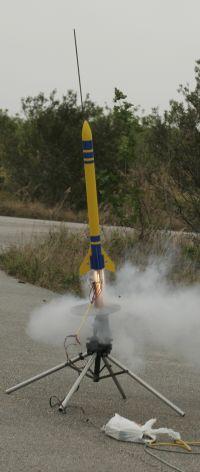
Flight:
The Weightlofter can be flown on 1, 3, 4, 5, or 7 motors. Any empty outboard
motor tubes act as stabilizers when empty. Regardless of the number used, there
must be one in the central mount for the recovery device to be ejected. All
outboard motors should be plugged or zero-second delay booster motors if BP or
have the ejection charge removed if AP to prevent any unwanted damage from
ejection charges. As noted in the instructions, nose weight is needed for most
clustered flights. No suggestions are give on how to add noseweight but fender
washers screwed into the base of the nose cone have been an effective,
adjustable, and easy solution with my USR Banshee and Miniroc 1.2 kits and
shouldn't be any different here since the nose cone is friction fitted into the
payload tube. For anyone new to clustering and/or composite motors, the
included AIR #3 document is a basic primer that explains the concepts of
friction fitting motors, and how to properly wire and ignite clustered flights
(also referred to as parallel staging), both of which apply to the Weightlofter
design. Information is also included on how to ignite multi-stage composite
motor rockets.
The first flight was on just a single motor, a F52-8T. The rocket was only covered in primer for this flight. I don't normally like to fly unfinished rockets but I was anxious to see how this rocket would perform. Ignition was instantaneous and on the first time thanks to the Quickburst Twiggy ignitor used in place of the Copperhead that came with the reload. With the calm skies, boost was as vertical as I've seen a rocket go. According to simulations, I was expecting about 1500' with the F52. I'd say that I got every bit of that if not a hair more. Impressive!
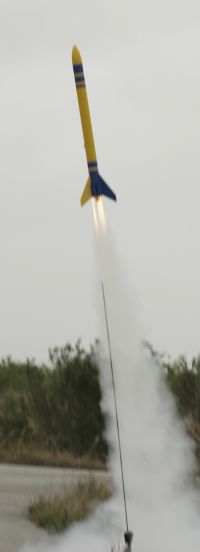 The
second flight came a couple months later. I was extremely fortunate to find
someone getting out of the hobby and had a large selection of BP motors that he
sold to me for real cheap. Among the selection was 2 packages of D11-P motors
and 1 package of E9-8 motors. Perfect! I contemplated going for broke with 6
D11-Ps surrounding a central E9-8 but A) I did not have a 7-motor clip whip at
the time and B) I did not want to risk launching it from 7 Estes ignitors even
if I would have had the proper clip whip. Instead I decided to be slightly more
"economical" and get twice the mileage out of my motor supply by
going with a pair flights on a trio of D11-Ps around central E9-8 (the third
flight is still pending...) Plus, I have a 4-motor clip whip. Now I only had to
add some noseweight for stability but not so much as to hurt overall
performance. A few large fender washers were screwed into the base of the nose
cone to add about 2oz to the front end ensuring stability for the 3 D11-Ps and
central E9-8 motors. I prepped all of the motors with masking tape at home the
night before so I wouldn't eat up most of the launch day getting it ready. The
motors were readied and the rocket was put on the pad. After several minutes of
hooking up the motors with the clip whip to connect up all 4 motors, we were
ready for lift off. With a healthy 12V source, there was no hesitation with
ignition from 4 standard Estes ignitors! All motors lit and away it went. While
I don't burn many BP motors much anymore, there is definitely something cool to
be said about the hiss of a large BP cluster! The Weightlofter cocked
noticeably into the stiff 10+mph winds.
The
second flight came a couple months later. I was extremely fortunate to find
someone getting out of the hobby and had a large selection of BP motors that he
sold to me for real cheap. Among the selection was 2 packages of D11-P motors
and 1 package of E9-8 motors. Perfect! I contemplated going for broke with 6
D11-Ps surrounding a central E9-8 but A) I did not have a 7-motor clip whip at
the time and B) I did not want to risk launching it from 7 Estes ignitors even
if I would have had the proper clip whip. Instead I decided to be slightly more
"economical" and get twice the mileage out of my motor supply by
going with a pair flights on a trio of D11-Ps around central E9-8 (the third
flight is still pending...) Plus, I have a 4-motor clip whip. Now I only had to
add some noseweight for stability but not so much as to hurt overall
performance. A few large fender washers were screwed into the base of the nose
cone to add about 2oz to the front end ensuring stability for the 3 D11-Ps and
central E9-8 motors. I prepped all of the motors with masking tape at home the
night before so I wouldn't eat up most of the launch day getting it ready. The
motors were readied and the rocket was put on the pad. After several minutes of
hooking up the motors with the clip whip to connect up all 4 motors, we were
ready for lift off. With a healthy 12V source, there was no hesitation with
ignition from 4 standard Estes ignitors! All motors lit and away it went. While
I don't burn many BP motors much anymore, there is definitely something cool to
be said about the hiss of a large BP cluster! The Weightlofter cocked
noticeably into the stiff 10+mph winds.
Recovery:
The bright orange 16" mylar parasheet (parachute) came preassembled and
includes Kevlar shroud lines and a snap swivel. Some interesting information is
given with the parasheet as far as creating a deployment device (consisting of
a metal ring or masking tape with all adhesive covered) to allow the chute to
open more slowly, which isn't a bad idea with a large mylar chute. I used a
couple of pieces of masking tape with the adhesive turned against each other to
form the ring. I attached the chute (with the tape ring near the chute) to a
small knot in the shock cord near the payload tube. A Nomex heat shield that I
use between several rockets was attached to the shock cord in lieu of dog barf
cellulose wadding. While there is room for the shock cord, parachute, beeper,
and heat shield, there wasn't room for anything else. I can't see using
anything longer than the AT 29/40-120 casing in the central motor mount.
Ejection for the first flight was right at apogee as the rocket just tipped over. The mylar chute opened quickly but gently. My rocket beeper went into chirp mode at that time and I watched it land within a hundred yards of the pad. The chute proved to be a perfect match for this rocket. There were a couple of small holes burned into the chute, but they're nothing that some clear tape won't easily patch.
On the second flight, the windy conditions were hard enough on the recovery system to rip the parachute right off the shock cord. The snap swivel failed completely but the rocket maintained a horizontal drag recovery (it was also aided by the drag from my Nomex heat shield) down to the soggy grass field below. As much as I want my rockets to recover as designed, I was slightly thankful for the chute failure only because the rocket landed easily within 200ft of the launch pad (unlike my USR El Lubbo's flight that recovered over 1/4 mile away earlier in the day from the winds!) Not a scratch or dent on the Weightlofter. So in the future I guess I'll have to use a small nylon chute if I fly it in windy conditions...
Flight Rating: 5 out of 5
Summary:
The U.S. Rockets Weightlofter is a super MPR cluster design that performs well
with either a single AP motor or multiple BP motors. It also is a kit that
requires some patience during construction because of the sheer number of
parts. With the central motor mount being further aft than the outboards, it
may be difficult to use flash pan ignition for 7 motor cluster launches so
investing in some good clip whips is probably the way to go. For me, clip whips
is definitely the way to go for 4 motor clusters!
Overall Rating: 5 out of 5
Other Reviews
- U.S. Rockets Weightlofter By Nick Esselman (June 30, 2008)
I took a big jump with my second U.S. Rockets' rocket, from the minimum diameter Fire and Forget to the seven (7) motor cluster Weightlofter. I've have been enjoying various clusters over the past year or so, but usually 2 or 3 motors. To date, my Phoenix Mighty Kat has the most clustered motors; 8 of them. So, I was looking forward to the Weightlofter for comparison sakes. U.S. Rockets (USR) ...
 |
 |
Flights
Sponsored Ads
 |
 |











